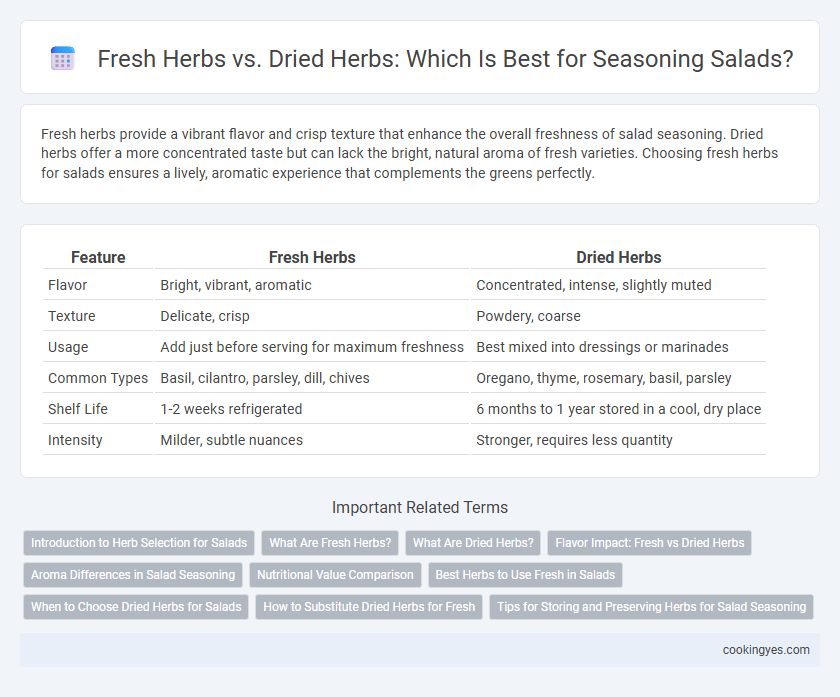Fresh herbs provide a vibrant flavor and crisp texture that enhance the overall freshness of salad seasoning. Dried herbs offer a more concentrated taste but can lack the bright, natural aroma of fresh varieties. Choosing fresh herbs for salads ensures a lively, aromatic experience that complements the greens perfectly.
Table of Comparison
| Feature | Fresh Herbs | Dried Herbs |
|---|---|---|
| Flavor | Bright, vibrant, aromatic | Concentrated, intense, slightly muted |
| Texture | Delicate, crisp | Powdery, coarse |
| Usage | Add just before serving for maximum freshness | Best mixed into dressings or marinades |
| Common Types | Basil, cilantro, parsley, dill, chives | Oregano, thyme, rosemary, basil, parsley |
| Shelf Life | 1-2 weeks refrigerated | 6 months to 1 year stored in a cool, dry place |
| Intensity | Milder, subtle nuances | Stronger, requires less quantity |
Introduction to Herb Selection for Salads
Fresh herbs like basil, cilantro, and parsley provide vibrant flavor and crisp texture that enhance salad freshness. Dried herbs such as oregano and thyme offer concentrated potency but lack the brightness and moisture needed for optimal salad seasoning. Selecting fresh herbs ensures a lively, aromatic profile that complements the freshness of salad ingredients.
What Are Fresh Herbs?
Fresh herbs are aromatic plants harvested recently, known for their vibrant flavors and bright colors that enhance salad seasoning. Common fresh herbs for salads include basil, cilantro, parsley, and dill, which provide a burst of natural freshness and delicate texture. Unlike dried herbs, fresh herbs contain higher moisture content and essential oils, making them ideal for light, crisp salad dressings and garnishes.
What Are Dried Herbs?
Dried herbs are dehydrated versions of fresh herbs, concentrated in flavor and aroma due to moisture removal. Common dried herbs like oregano, thyme, and basil retain their essential oils, making them potent for seasoning salads with a more intense taste. Unlike fresh herbs, dried varieties have a longer shelf life and are convenient for consistent seasoning throughout the year.
Flavor Impact: Fresh vs Dried Herbs
Fresh herbs like basil, cilantro, and parsley deliver vibrant, aromatic flavors that elevate salad dressings and toppings, offering bright, nuanced notes. Dried herbs, with concentrated and intensified flavor profiles, provide a potent seasoning but can sometimes lack the subtle freshness and delicate texture of fresh varieties. Using fresh herbs enhances the overall sensory experience of salads, while dried herbs are ideal for longer-lasting, more robust seasoning in vinaigrettes or marinade blends.
Aroma Differences in Salad Seasoning
Fresh herbs offer a vibrant, bright aroma that enhances the salad's natural flavors, providing a crisp and lively scent profile. Dried herbs possess a more concentrated, earthy aroma but may lack the freshness and subtlety of their fresh counterparts. Using fresh herbs in salad seasoning maximizes aromatic complexity, while dried herbs can add depth and intensity.
Nutritional Value Comparison
Fresh herbs, such as basil, cilantro, and parsley, retain higher levels of vitamins A, C, and K compared to their dried counterparts, which lose some nutritional potency during drying. Dried herbs concentrate flavors but often have reduced antioxidant content and fewer heat-sensitive nutrients. Using fresh herbs in salads maximizes nutritional benefits, enhancing both taste and health value.
Best Herbs to Use Fresh in Salads
Fresh herbs such as basil, cilantro, parsley, and mint provide vibrant flavors and a bright aroma that dried herbs cannot replicate in salads. These fresh herbs retain essential oils and delicate textures that enhance the overall freshness and complexity of salad dressings and toppings. Using fresh herbs ensures maximum flavor impact and nutritional benefits, making them ideal for light and crisp salad seasoning.
When to Choose Dried Herbs for Salads
Dried herbs are ideal for salad dressings and vinaigrettes where their concentrated flavor infuses more evenly over time. Use dried herbs when a dish benefits from a longer marinating period, allowing flavors to meld without the risk of fresh herbs wilting. Their extended shelf life and intense taste make them perfect for seasoning dressings or adding subtle earthiness to grain-based salads.
How to Substitute Dried Herbs for Fresh
When substituting dried herbs for fresh in salad seasoning, use one-third the amount because dried herbs have a more concentrated flavor than fresh. For example, if a recipe calls for 1 tablespoon of fresh basil, use 1 teaspoon of dried basil instead. To enhance flavor release, crush dried herbs between your fingers before adding them to the salad.
Tips for Storing and Preserving Herbs for Salad Seasoning
Fresh herbs for salad seasoning offer vibrant flavor but require careful storage in airtight containers with a damp paper towel to maintain moisture and prolong freshness. Dried herbs, while less potent in aroma, benefit from being kept in cool, dark places within sealed glass jars to preserve their essential oils and extend shelf life. To maximize herb quality, avoid exposure to heat, light, and humidity, which degrade both fresh and dried herbs, ensuring salads remain flavorful and aromatic.
Fresh herbs vs dried herbs for salad seasoning Infographic

 cookingyes.com
cookingyes.com